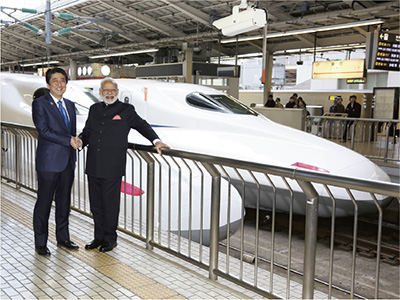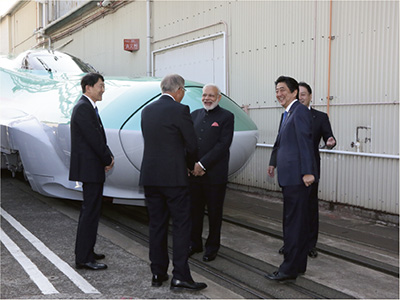Diplomatic Bluebook 2017
Chapter 3
Japan's Foreign Policy to Promote National and Worldwide Interests
2.Support for Japanese Companies' Overseas Business Expansion in Promoting Public and Private Partnerships
(1) Promotion of Japanese Companies' Overseas Business Expansion by Ministry of Foreign Affairs (MOFA) and Accompanying Diplomatic Missions Overseas
The number of Japanese companies holding overseas branches has increased in recent years and reached 71,12915 as of October 2015. The ratio of overseas manufacturing production has risen in recent years to 24.3% – a record-high level in 201316. One of the reasons behind this is that a lot of Japanese companies, supporting Japanese economic development, have embarked on expansion overseas, aiming at further cultivation of foreign markets. To incorporate vigorous economic growth abroad, mainly in Asia, into the Japanese economy, support for Japanese companies by the government has become more important.
In light of such a situation, under the leadership of “Headquarters for the Promotion of Japanese Business Support17” headed by the Foreign Minister, MOFA has engaged in tandem with the diplomatic missions overseas in supporting Japanese companies in order to promote expanding businesses overseas. The “Division for Promotion of Public and Private Partnership,” established in September 2015 within the Economic Affairs Bureau, oversees the forming of public and private partnerships in the expansion of Japanese companies overseas by gathering information and laying down policies in support of companies, responding to inquiries from companies, engaging in PR activities, etc. Initiatives are being implemented with the support of the entire ministry.
At the diplomatic missions overseas, all staff, including those responsible for Japanese business support, have supplied various pieces of information for Japanese companies and lobbied foreign governments under the leadership of ambassadors and consul-generals with the aim of providing meticulous and specific support according to the conditions in various regions, and under the motto of being “the most open and responsive government office in the world.” Moreover, promoting the “Japan brand,” such as the products, technologies, services and agricultural, forestry and fishery products of Japanese companies at receptions to celebrate the birthday of His Majesty the Emperor, and various other events and exhibitions held by overseas diplomatic missions, is another important initiative in supporting Japanese companies. MOFA is also proactive in providing embassies and ambassadors' residences as venues for holding exhibitions of the products of Japanese companies and local governments, food tasting events, etc., as well as holding seminars on business expansion, and social gatherings for local companies and associated organizations.
 Reception to promote Japanese food, sake, and food culture (Embassy of Japan in Italy)
Reception to promote Japanese food, sake, and food culture (Embassy of Japan in Italy)- 15 The Statistics on the Japanese Nationals Residing Overseas, MOFA
- 16 The 45th Survey of Overseas Business Activities, METI
- 17 Established in December 2013. The system was bolstered in May 2015 by appointing the two state ministers for foreign affairs as deputy chiefs, and all Parliamentary vice-ministers for foreign affairs as acting chiefs.
(2) Promotion of Overseas Business Expansion of Japanese Infrastructure System
In order to respond to infrastructure demands mainly in emerging countries and promote infrastructure exports by Japanese companies, a “Ministerial Meeting on Strategy Relating to Infrastructure Export and Economic Cooperation,” consisting of relevant cabinet ministers with the Chief Cabinet Secretary serving as chair, was established within the Cabinet Secretariat in 2013. Since then, a total of 28 meetings have been held as of the end of 2016, to focus on individual issues, including specific countries and regions, railways, and information communication, in addition to discussing the laying down of “Strategy for Exporting Infrastructure Systems” and following up on them, with the aim of strengthening qualitative and quantitative support through expansion of the risk-money supply, the speeding up of yen loans, expansion of targets for overseas loans and investments, implementing of strategic PR, etc.
The framework to promote the development of overseas business expansion of Japanese infrastructure systems is being maintained and reinforced through schemes such as the promotion of “top-level sales” led by officials including Prime Minister Abe and Foreign Minister Kishida, the improved system to make use of yen credits more strategically, and the support for Japanese companies through embassies and consulates-general in various nations. MOFA has appointed “officers in charge of Infrastructure Projects,” who gather and consolidate information on infrastructure projects, in the diplomatic missions overseas in countries of focus (173 personnel, at 88 diplomatic missions overseas in 69 countries as of December 2016).
As concrete results of these efforts, Japanese companies or their group companies received orders for such projects as the launching of a Mars probe (UAE), thermal power plants (Indonesia, Uzbekistan, etc.), and an urban railway system (Thailand).
(3) Promotion of the Export of Agricultural, Forestry and Fishery Products and Food
The Government of Japan has set a goal of expanding the value of the export of Japanese agricultural, forestry and fishery products and food to 1 trillion yen by 2019 (“Economic Measures for Realizing Investment for the Future”). MOFA, in collaboration with relevant ministries and agencies, Japanese companies, local governments, etc., and by utilizing the diplomatic missions overseas all over the world, is energetically promoting the attractiveness of Japanese products at events held at embassies and consulate generals, etc., such as receptions to celebrate the birthday of His Majesty the Emperor. At the same time, MOFA has responded to inquiries from business operators, including those involved in exporting agricultural, forestry and fishery products and food. In particular, Japanese business support officers (in charge of the food industry) were assigned to 58 diplomatic missions overseas in 54 countries and regions to strengthen initiatives to promote the export of agricultural, forestry and fishery products and food.
Although six years have passed since the Great East Japan Earthquake and the accident at Tokyo Electric Power Company's Fukushima Daiichi Nuclear Power Plant (TEPCO's, Fukushima Daiichi NPS), many countries and regions continue to place import restrictions on Japanese agricultural and fishery products and food. Based on scientific evidence, MOFA has requested other countries to consider the relaxation or abolition of import restrictions as soon as possible by providing each country with timely and accurate information and using WTO frameworks in collaboration with relevant ministries and agencies, in order to eliminate harmful rumors about agricultural and fishery products, which are the main products of the disaster-stricken area.
As a result of these efforts, import restrictions were lifted in India (February), Kuwait (May), Nepal (August), Iran (December), and Mauritius (December). So far, 21 countries have removed their import restrictions (Canada, Myanmar, Serbia, Chile, Mexico, Peru, Guinea, New Zealand, Colombia, Malaysia, Ecuador, Viet Nam, Iraq, Australia, Thailand, Bolivia, India, Kuwait, Nepal, Iran and Mauritius). In addition, restrictions were eased in 2016 by the U.S., 28 EU Member States, Switzerland, Norway, Iceland, Liechtenstein, Egypt, Brunei, French Polynesia, Israel, Qatar, New Caledonia and the UAE, and the number of regions and items subject to import restrictions are on the decline (as of the end of December 2016).
MOFA will continue persistent efforts, collaborating with relevant ministries and agencies, to urge countries and regions, which maintain import restrictions, to ease or remove restrictions as soon as possible by such means as making requests at the leaders' and ministerial levels, through all routes, including bilaterally and through the WTO.
Column
The global supply and demand gap in infrastructure investment, and the realization of sustainable growth are serious issues facing the international community. In order to tackle these issues, the international community is becoming more aware that it is necessary to pursue both the quality and quantity of infrastructure and to promote quality infrastructure investment. “Quality infrastructure investment” refers to investment that takes into account not only the cost of infrastructure itself but also elements such as the life-cycle cost including maintenance and management, safety and resilience, consideration for environmental and social aspects, local job creation and human resource development, and effective utilization of public and private funds including through public-private partnerships (PPP) under full consideration of the developmental phase of the recipient country and other factors. In May 2016, at the G7 Ise-Shima Summit with Japan holding the G7 Presidency, G7 agreed on the “G7 Ise-Shima Principles for Promoting Quality Infrastructure Investment,” which incorporates the fundamental elements of quality infrastructure investment.
With the aim of promoting quality infrastructure investment, Prime Minister Abe unveiled the “Partnership for Quality Infrastructure” in May 2015. Under this initiative, Japan, in collaboration with the Asian Development Bank (ADB), will provide approximately US$110 billion for quality infrastructure investment in Asia over the next five years starting in 2016, and through efforts to improve loan assistance systems, work toward providing even more attractive financing to fulfill infrastructure demand in Asia. On May 23, 2016, Prime Minister Abe announced the “Expanded Partnership for Quality Infrastructure”, through which the public and private sectors will provide financing of approximately US$200 billion to fulfill infrastructure demand not only in Asia but across the world. At the same time, he also announced plans to further improve loan assistance systems and to strengthen the structures of government institutions that provide assistance, including the Japan International Cooperation Agency (JICA).
Alongside these initiatives to provide funds and improve various systems, Japan is also working on concrete projects on quality infrastructure. In India, for example, Japan and India cooperate to advance the high-speed railway project that connects around 500 km between Mumbai and Ahmedabad. In this project, the decision has been made to introduce Japan's Shinkansen (bullet train) system. It is expected to utilize Japan's advanced technology to develop high-speed railways through human resource development for the operation, maintenance, and management of the high-speed railways as well as technology transfer. Japan intends to financially support the realization of this project by providing funds for the project in a timely manner. This project will contribute to promoting the flow of people and goods in India, revitalizing the Indian economy, and transferring Japan's safe and high-performance technology to India which makes this project a good example of quality infrastructure investment. Going forward, Japan hopes to continue cooperating with countries and international institutions in Asia and around the world to promote such quality infrastructure investment in various countries.


Prime Minister Abe inspecting the Shinkansen and Shinkansen factory with Prime Minister Modi of India (November 12, Tokyo Station, and factory specializing in the production of railway cars in Kobe City, Hyogo Prefecture. Photo: Cabinet Public Relations Office)
(4) The UK's Withdrawal from the EU: Message from Japan
In response to the impact on the activities of Japanese business and the real economy, resulting from the national referendum on June 23 in support of the UK's withdrawal from the EU, Japan established the Government Task Force Regarding the Withdrawal of the UK from the EU18 in July, chaired by Deputy Chief Cabinet Secretary Hagiuda.
Japanese businesses operating in the UK and the EU, in their diversity in size, sectors and the context in which they invested in the market, are said to have more than 6,000 bases throughout Europe. Many Japanese businesses made their way into the EU market, assuming that the freedom of economic activities is ensured. In the UK amongst others, where diverse industries locate their bases, there are outstanding voices calling for the UK to continue to participate in the “Single Market19” and “Single Passport20.”
“Japan's Message to the UK and the EU”21 was adopted at the 3rd meeting of the government task force to address the UK's withdrawal from the EU held in September, to ensure that the views of business are represented appropriately during withdrawal negotiations between the UK and the EU. The Message was conveyed promptly to the UK and the EU, including during the brush-by meeting at the G20 Hangzhou Summit between the leaders of Japan and the UK (September 5), and the Japan-UK leaders' meeting held during the UN General Assembly (September 20). Moreover, the Embassy of Japan in the UK has continued dialogue with the British government, based on the Message. While holding a series of explanatory meetings for Japanese businesses with the participation of British dignitaries, Japan's diplomatic missions to relevant countries have also been gathering the latest information related to the UK's withdrawal from the EU and providing information to Japanese businesses.
- 18 The Government Task Force Regarding the Withdrawal of the UK from the EU, chaired by Deputy Chief Cabinet Secretary Hagiuda, was established in July 2016. It compiled concerns and requests of the business community, centered on Japanese businesses operating in Europe, through the relevant ministries and agencies (the Cabinet Office, Financial Services Agency, Ministry of Foreign Affairs, Ministry of Finance, Ministry of Health, Labour and Welfare, Ministry of Agriculture, Forestry and Fisheries, Ministry of Economy, Trade and Industry, Ministry of Land Infrastructure and Transport, and the Personal Information Protection Commission Secretariat). Four meetings have so far been held (the 1st meeting was held on July 27, 2016, the 2nd on August 18, the 3rd on September 2, and the 4th on January 19, 2017).
- 19 A system allowing the free movement of people, goods, services and capital between EU Member States without being hindered by borders or other obstacles, just as they move freely within each Member State.
- 20 A system ensuring the freedom to establish and operate branch offices and to provide financial services in all other EU Member States, upon acquiring a license in one Member State.
- 21 The main points of Japan's message to the UK and the EU are as follows: (1) Japan expects to continue cooperating and collaborating closely with the UK and the EU for international peace, stability and prosperity, (2) Japan expects the maintenance of an open Europe with its free trade system, and agreement in principle on the Japan-EU EPA during the year, (3) Japan requests the securing of predictability in BREXIT negotiations through an uninterrupted and transparent process, (4) Japan requests the UK and the EU to heed the voices of Japanese businesses to the fullest extent and to do their utmost to cooperate in taking the necessary measures, and (5) Japan is willing to cooperate with the UK and the EU so that the process of negotiations for the UK's withdrawal will not cause major disturbance to the world economy.

